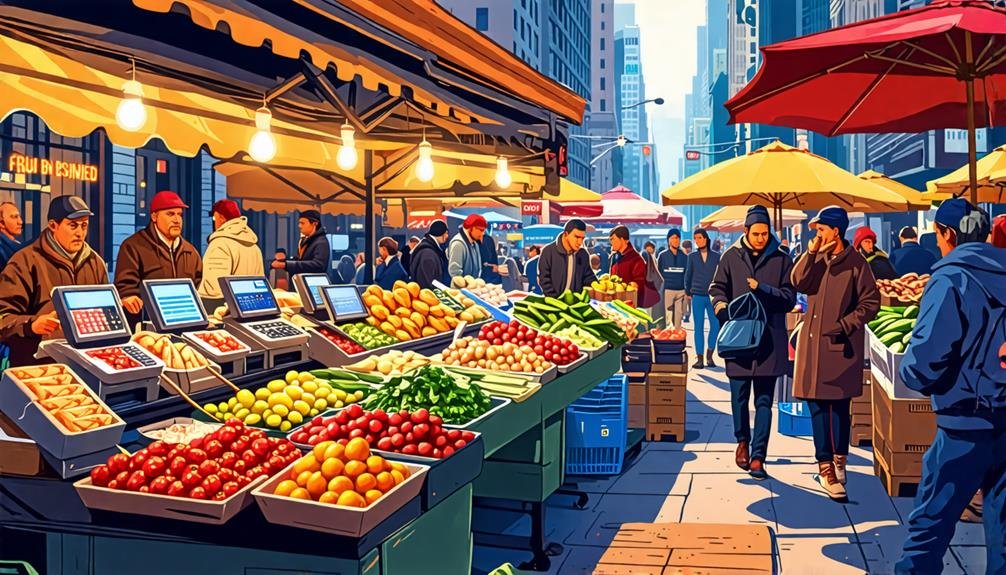In New York City, dining out is subject to an 8.875% sales tax, which applies to your entire bill, including food, beverages, and any service charges.
However, purchasing unprepared grocery items for home consumption, such as milk, bread, fruits, and vegetables, is generally tax-exempt, promoting household savings and supporting basic nutritional access.
Prepared foods, like rotisserie chickens or pre-made salads, are exceptions and are taxable.
Understanding these tax distinctions is crucial for effective budget management in the city, impacting both your dining experiences and grocery expenses.
This tax structure reflects the city's policy to encourage healthy eating habits by making basic groceries more financially accessible while generating revenue from restaurant sales and prepared items.
Key Takeaways
- In New York City, the total sales tax rate applied to purchases is 8.875%, which is a combination of state, city, and additional surcharges.
- Essential grocery items such as milk and bread, intended for home consumption, are not subject to this sales tax, promoting both economic relief and nutritional health.
- Prepared food items, including rotisserie chickens and pre-packaged salads, incur the full sales tax rate of 8.875%, reflecting their ready-to-eat convenience.
- The act of dining out also attracts the 8.875% sales tax, applied uniformly to both food and drink items, underscoring a consistent taxation policy across all prepared meals.
Overview of NYC Sales Tax
In New York City, the total sales tax rate is 8.875%. This includes the New York state sales tax of 4%, the city's own tax of 4.5%, and a 0.375% surcharge supporting the Metropolitan Commuter Transportation District.
This uniform rate applies across all boroughs: Manhattan, Brooklyn, Queens, the Bronx, and Staten Island.
When making purchases in NYC, whether it's retail goods or dining out, this tax rate is automatically applied at checkout. It's essential to be aware that this tax covers both tangible personal property and specific services, including restaurant meals.
Additionally, the sales tax extends to accommodations, parking services, and tickets to certain cultural or sporting events.
When planning your expenses, consider this tax to avoid surprises in your final bills, ensuring a smooth financial experience while enjoying the city's offerings.
Tax Rates on Groceries
In New York City, while the overarching sales tax rate of 8.875% applies to many purchases, grocery items intended for home consumption are notably exempt, offering a financial reprieve during your grocery shopping.
It's crucial to understand which items qualify for this exemption to effectively manage your finances. Essential staples such as milk, bread, fruits, and vegetables are exempt from tax when sold unprepared. In contrast, prepared items like a rotisserie chicken or a pre-made salad are taxable, reflecting the city's policy to encourage home cooking and healthier eating habits by making basic, unprocessed foods more economically accessible.
Additionally, while shopping, be aware that non-food products within grocery stores, such as cleaning supplies and personal care items, remain taxable. Always verify your receipt to ensure the taxation was applied correctly, safeguarding against unexpected charges.
This tax structure not only influences your immediate spending but subtly guides consumer behavior towards more sustainable and health-conscious choices, reinforcing the community's values around wellness and environmental stewardship.
Understanding and adapting to these nuances ensures that you can navigate grocery shopping more effectively, potentially saving a considerable amount on taxes annually.
Dining Out: Tax Implications
When you dine out in NYC, the total cost of your meal will include an 8.875% sales tax. This rate is a cumulative figure that includes taxes from New York State, New York City, and the Metropolitan Commuter Transportation District. Regardless of the dining establishment—be it a casual fast-food restaurant or a sophisticated, high-end eatery—this tax applies uniformly to your entire bill.
The tax encompasses every item on your bill, not just the food. Beverages, desserts, and any service charges are also taxed at the 8.875% rate. It's essential to incorporate this tax when planning your dining budget, as it significantly affects the overall cost.
For larger groups, a service charge often included in the bill is taxable as well. It's crucial to differentiate this from a gratuity; a service charge is a mandatory part of your payment, treated as part of your taxable expenditure.
Always examine your bill carefully to ensure taxes are correctly calculated and understand that any additional gratuity should reflect the quality of service received, independent of the obligatory service charge.
Tax Exemptions on Food
When shopping for groceries in New York City, it's important to know which items are tax-exempt to make cost-effective decisions.
Essential groceries such as milk, bread, and vegetables aren't subject to sales tax. However, prepared foods, certain snacks, and dining out typically incur sales tax.
This distinction in taxation reflects a broader societal value placed on essential sustenance and health.
Eligible Grocery Items
In New York City, essential grocery items are not subject to sales tax, promoting affordability for all residents. This tax exemption encompasses a diverse range of staple products, which helps households manage their budgets more effectively without the financial strain of additional taxes on necessary goods.
Below is a guide detailing the types of items eligible for tax exemption:
| Tax-Exempt Category | Examples |
|---|---|
| Fruits and Vegetables | Apples, Carrots |
| Meat and Poultry | Chicken, Beef |
| Dairy Products | Milk, Cheese |
| Bakery Products | Bread, Cookies |
| Cereals and Cereal Products | Oatmeal, Rice |
It's important to note that this tax exemption applies exclusively to unprepared and unheated foods intended for home preparation. Therefore, even if items fall within the above categories, prepared or heated foods do not qualify for the exemption. To benefit from tax-free shopping, ensure you select items that require preparation and are not ready-to-eat. This distinction is crucial for maintaining lower grocery expenses.
Dining Out Exceptions
When dining out in New York City, you might notice that certain basic food items aren't subject to sales tax, as they're classified under essentials. For instance, whole bagels or loaves of bread purchased without any toppings or spreads are tax-exempt. This exemption applies primarily when these items are bought for takeaway in their basic, unaltered form.
Conversely, if you choose to enjoy a bagel toasted with cream cheese at a café, this modification and the in-café service render it taxable. The key factor here is the preparation and consumption context; a plain bagel for home is tax-free, while one prepared for immediate consumption on-site is not.
The same principle applies to coffee. A standard, unadorned cup of coffee to go remains untaxed. However, coffee enjoyed as part of a dine-in service incurs sales tax due to the additional service provided, which transforms it into a prepared food item ready for immediate consumption.
These distinctions, reflecting the interplay between food service style and tax policy, highlight an opportunity for tax savings based on your consumption choices. When opting for simple, unprepared items off-premises, you can avoid the sales tax, while more serviced dining experiences lead to taxable scenarios. Keep this in mind to potentially reduce costs during your culinary ventures in the city.
Prepared Food Vs. Grocery Items
Distinguishing between prepared food and grocery items is crucial for understanding sales tax implications in NYC. Generally, grocery items are tax-exempt, whereas prepared foods are taxable.
Prepared food typically includes meals or food items that are ready for immediate consumption. This category encompasses food from restaurants, fast food outlets, and prepared sections in grocery stores, such as salads or pre-cooked meals. For example, purchasing a hot rotisserie chicken or a freshly made sandwich falls under prepared food.
Conversely, grocery items are typically ingredients or products that require additional preparation before they can be consumed. This category includes raw materials like vegetables, meats, and flour, as well as packaged goods such as bread and cereal. These items are generally tax-exempt as they are considered essential for basic living.
Below is a reference table to clarify the tax status of various items, helping you navigate purchases in NYC effectively:
| Category | Examples | Tax Status |
|---|---|---|
| Prepared Food | Sandwich, Hot pizza | Taxable |
| Grocery Items | Raw chicken, Apples | Non-Taxable |
| Both | Rotisserie chicken | Taxable |
| Both | Bagels (plain) | Non-Taxable |
| Both | Prepared salad | Taxable |
This table serves as a guide to help you discern the category of food items during shopping or dining out, ensuring a clear understanding of tax responsibilities and avoiding any unexpected costs at checkout.
Special Cases and Exceptions
Navigating the labyrinth of food taxation laws in NYC can be quite the conundrum. It's intriguing to note that a plain bagel escapes taxation, yet once it's sliced or adorned with cream cheese, it morphs into a taxable commodity as a prepared food. This transformation echoes in the realm of cakes too; whole cakes enjoy a tax-exempt status, but become taxable once sliced.
The temperature of your sandwich also plays a crucial role in determining its tax status. A cold sandwich remains tax-free, emphasizing the preference for unaltered, basic food items. However, warming it up triggers a tax implication, aligning with the broader categorization of heated items as prepared foods.
In a curious twist, purchasing a bulk of five or more bagels or donuts shifts their classification to grocery items, thus exempting them from tax. This highlights a societal favor towards bulk purchasing for household stocking, as opposed to individual consumption, which is taxed.
Furthermore, despite their role in health and nutrition, dietary supplements and vitamins consistently attract taxation, reflecting a delineation between essential foodstuff and optional health enhancements. This is paralleled in the treatment of candy and soda, which, irrespective of their popularity, are unfailingly taxable, marking them as non-essential luxuries.
These nuances underscore a deeper societal reflection on consumption habits, health, and the economic structures influencing our food choices. Understanding these aspects can significantly impact your shopping behavior, especially in discerning when a purchase might or mightn't incur additional costs due to tax.
Impact on Tourists and Residents
In New York City, the variable sales tax on food items often catches both tourists and residents off guard, impacting their budgets in significant ways. For tourists, the fluctuation in taxes can inflate the cost of dining experiences, affecting everything from high-end restaurants to street food, thus increasing the overall expense of their visit. This unexpected rise in meal costs can subtly alter the enjoyment and frequency of dining out, potentially reshaping the tourist experience in NYC.
For residents, the impact is more sustained. The sales tax on everyday food purchases adds up, influencing how much they spend on groceries and dining out. This consistent increase in spending can limit their financial flexibility, forcing adjustments in other areas of expenditure. Over time, this can lead to a noticeable strain on personal budgets, affecting residents' overall quality of life.
This dynamic underscores the broader implications of local tax policies on the financial realities of both visitors and locals. Understanding these policies is crucial for managing expectations and budgets effectively in New York City.
Tips for Managing Food Expenses
To effectively manage your food expenses in NYC, it's wise to plan your meals in advance and scour local markets for bargains. Knowing your weekly menu helps curb impulsive purchases and costly last-minute decisions.
Local farmers' markets are a treasure trove of fresh produce, often available at lower prices than supermarkets, particularly towards closing time when vendors aim to sell remaining stock.
Embrace the practice of meal prepping. Cooking in bulk not only saves time but also significantly reduces costs. Invest in quality containers and cook large quantities of adaptable meals like stews, casseroles, or stir-fries, which can be frozen and easily reheated. This strategy helps avoid the lure of expensive takeout.
Take advantage of loyalty programs and coupons. Most grocery stores offer rewards programs that provide discounts, and using coupons can substantially lower your grocery bills. Also, subscribe to apps and websites that notify you of ongoing sales and promotions in nearby stores.
Monitor your food expenditure by using budget-tracking apps or a straightforward spreadsheet. This oversight allows you to pinpoint areas for financial adjustment or enhancement.
Frequently Asked Questions
How Does Sales Tax Affect Food Delivery Services in Nyc?
In New York City, the inclusion of sales tax on prepared food adds an additional cost to food delivery services, thus making the delivered meals somewhat more expensive than if one were to purchase ingredients and cook at home.
This effect is particularly noticeable given the high tax rates prevalent in the city, which cumulatively enhance the overall financial burden on consumers.
This scenario underscores the urban cost of convenience, where the luxury of delivered meals comes at a premium, reflecting both the economic and social dynamics of living in such a vibrant, yet expensive, urban landscape.
Are Food Coupons and Discounts Taxed in Nyc?
In New York City, food enthusiasts can leverage coupons and discounts to their advantage, as sales tax is applied only to the price paid after the discount.
For instance, if you apply a coupon to reduce the cost of a $10 sandwich to $5, the sales tax will be calculated based on the $5 price.
This tax policy enhances the value of using coupons in NYC, allowing residents and visitors to enjoy more of what the city's diverse culinary scene has to offer while managing expenses effectively.
Is Sales Tax Applied to Food Sold at Educational Institutions?
In NYC, food sold at educational institutions such as schools and colleges is exempt from sales tax.
This policy helps ensure that meals are more affordable for students, supporting their educational experience by easing financial burdens.
When purchasing meals directly from facilities on campus like cafeterias or snack bars, students benefit from this tax exemption, making dining on campus a cost-effective option.
This exemption reflects a commitment to fostering accessible education environments by reducing the financial impact on students.
How Does NYC Sales Tax on Food Compare to Other Major Cities?
Navigating the intricate landscape of tax rates in major cities reveals an interesting scenario for NYC. Here, essential grocery items remain untaxed, promoting affordability and accessibility.
However, prepared foods fall under the standard sales tax rate of 8.875%, positioning NYC at a median level compared to other major cities.
This particular tax structure reflects a balance between fostering basic sustenance and leveraging economic revenue from dining out, which significantly influences the city's social and economic fabric.
Does NYC Have a Tax Refund Policy for International Tourists on Food Purchases?
New York City doesn't provide a tax refund for international tourists on food purchases.
While some destinations offer VAT refunds to visitors, NYC applies the same sales tax regulations to everyone, regardless of nationality.
Consequently, as a visitor, you'll incur the standard tax charges on all food items during your stay, without the possibility of a tax reimbursement.
Conclusion
Navigating the vibrant food markets of NYC, it's essential to understand the tax implications on different types of food purchases.
Groceries, such as basic grains and vegetables, are exempt from sales tax, offering a sense of financial relief akin to a breeze passing effortlessly through a net.
However, prepared meals sold by vendors attract a sales tax, adding an extra cost to your purchase much like seasoning adds layers to a dish's flavor.
Both residents and tourists should be aware of these distinctions to manage their budgets effectively in NYC's diverse culinary landscape, where every choice can impact the weight of your wallet.






